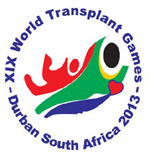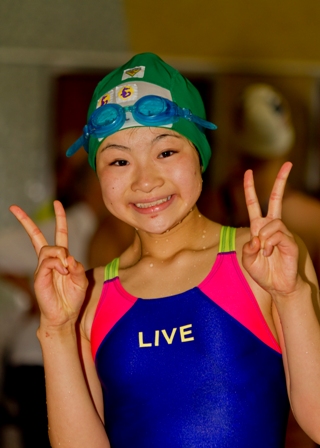By Dr. Efraim Kramer
 The XIX World Transplant Games (Games), under the auspices of the World Transplant Games Federation, is heading for Durban, South Africa in July 2013. These Games are open to all organ transplant recipients internationally and it is expected that 1500 athletes from 52 countries will participate in the 5 day sporting event. This major sporting event, a celebration of life by those who have been afforded a second chance, consists of exclusively non-contact events such as track and events, cycling, mini marathon, ten pin bowling, volleyball, pétanque, lawn bowls, badminton, tennis, squash, table tennis, golf and a wide spectrum of swimming events. All sporting events are further risk categorised into physiological low (golf), medium (table tennis) and high (athletics) stress level sporting events.
The XIX World Transplant Games (Games), under the auspices of the World Transplant Games Federation, is heading for Durban, South Africa in July 2013. These Games are open to all organ transplant recipients internationally and it is expected that 1500 athletes from 52 countries will participate in the 5 day sporting event. This major sporting event, a celebration of life by those who have been afforded a second chance, consists of exclusively non-contact events such as track and events, cycling, mini marathon, ten pin bowling, volleyball, pétanque, lawn bowls, badminton, tennis, squash, table tennis, golf and a wide spectrum of swimming events. All sporting events are further risk categorised into physiological low (golf), medium (table tennis) and high (athletics) stress level sporting events.

Several things makes this sporting event unique. Beyond the special medical entry requirements of each athlete, there is:
- The array of approved anti-rejection and related medications administered by each athlete.
- The requirement for a transplant physician medical certificate confirming the athlete’s health and fitness to participate in the sporting events selected. And;
- The participation of both children and adults in the Games, albeit in different events.
No athletes are permitted to participate if they are undergoing any form of organ rejection or renal failure, anaemia, immunosuppression instability, hypertension, cardiac arrhythmia or infection.
Most participating teams are accompanied by medical personnel who take overall responsibility for each team member’s medical requirements and occasional problems, but this may not necessarily be so for smaller teams. Therefore the medical services plan for these Games cover an anticipated spectrum of medical incidents, including those related to organ transplantation matters. As such, the local organising committee (LOC) includes organ transplant medical and professional personnel and organ transplant delegated medical institutions, so that any non-sport related, organ transplant specific medical event, including acute organ rejection, acute infections or organ dysfunction, to mention a few, may be immediately referred for organ transplant medical specialist opinion and management, if required. It is also mandatory that the medical LOC has access to the medical file of every participant. This is necessary not only to confirm participation on health grounds, but to have advanced knowledge of the athlete’s medications, their local availability, organ transplant approved infectious disease prophylaxis and immunization status. Immunizations may include tetanus, malaria and rabies if the Games athletes engage in local safari, a major tourist attraction in this part of the world.
Needless to say, an international sporting event of this nature is a valuable educational opporunity for athletes and medical LOCs. We will update the BJSM Blog with highlights during the Games.
*****************************************************
Efraim Kramer, Chief Medical Officer: World Transplant Games, South Africa 2013
Professor + Chair: Division of Emergency Medicine
Honorary Professor: Exercise Science + Sports Medicine
University of the Witwatersrand, Johannesburg.